A Literature Review of Article on Cross-Cultural Management Research
VerifiedAdded on 2021/05/31
|12
|3028
|142
Literature Review
AI Summary
This literature review examines the article "From cross-cultural management to global leadership: Evolution and adaptation" by Allan Bird and Mark E Mendenhall. The review begins with an overview of the article, which explores the evolution of cross-cultural management and its relationship to global leadership, discussing cultural influences across different eras and the emergence of global leadership. It analyzes the three types of cross-cultural management studies: unicultural, comparative, and intercultural research, and delves into the streams of global leadership, including expatriate management, intercultural communication, and comparative leadership. The review also addresses the limitations of cross-cultural research, particularly the dominance of Western perspectives, and concludes by summarizing the key findings and suggesting avenues for further research in the field. The review references several scholars and their work, including Hofstede, to provide a comprehensive understanding of the subject.
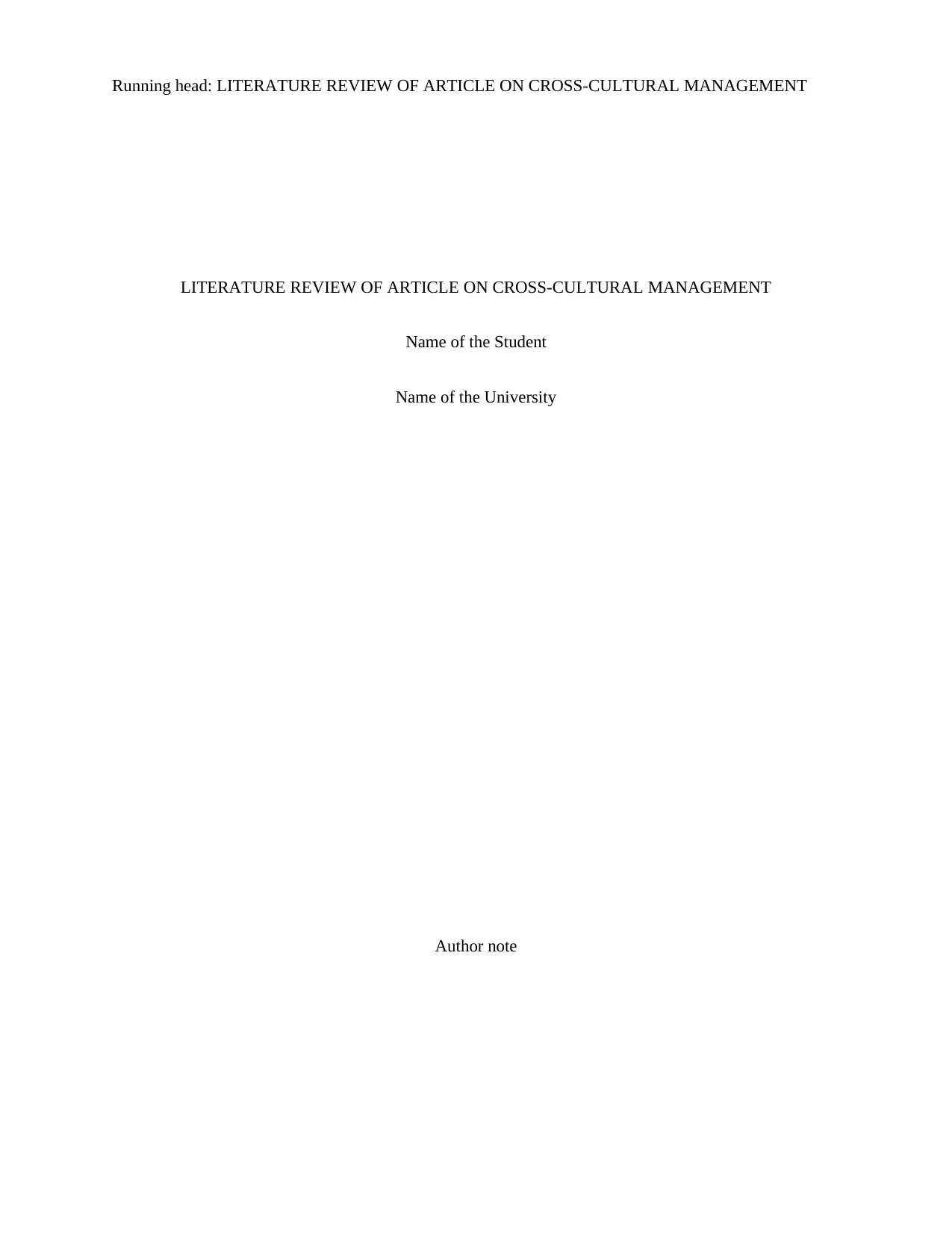
Running head: LITERATURE REVIEW OF ARTICLE ON CROSS-CULTURAL MANAGEMENT
LITERATURE REVIEW OF ARTICLE ON CROSS-CULTURAL MANAGEMENT
Name of the Student
Name of the University
Author note
LITERATURE REVIEW OF ARTICLE ON CROSS-CULTURAL MANAGEMENT
Name of the Student
Name of the University
Author note
Paraphrase This Document
Need a fresh take? Get an instant paraphrase of this document with our AI Paraphraser
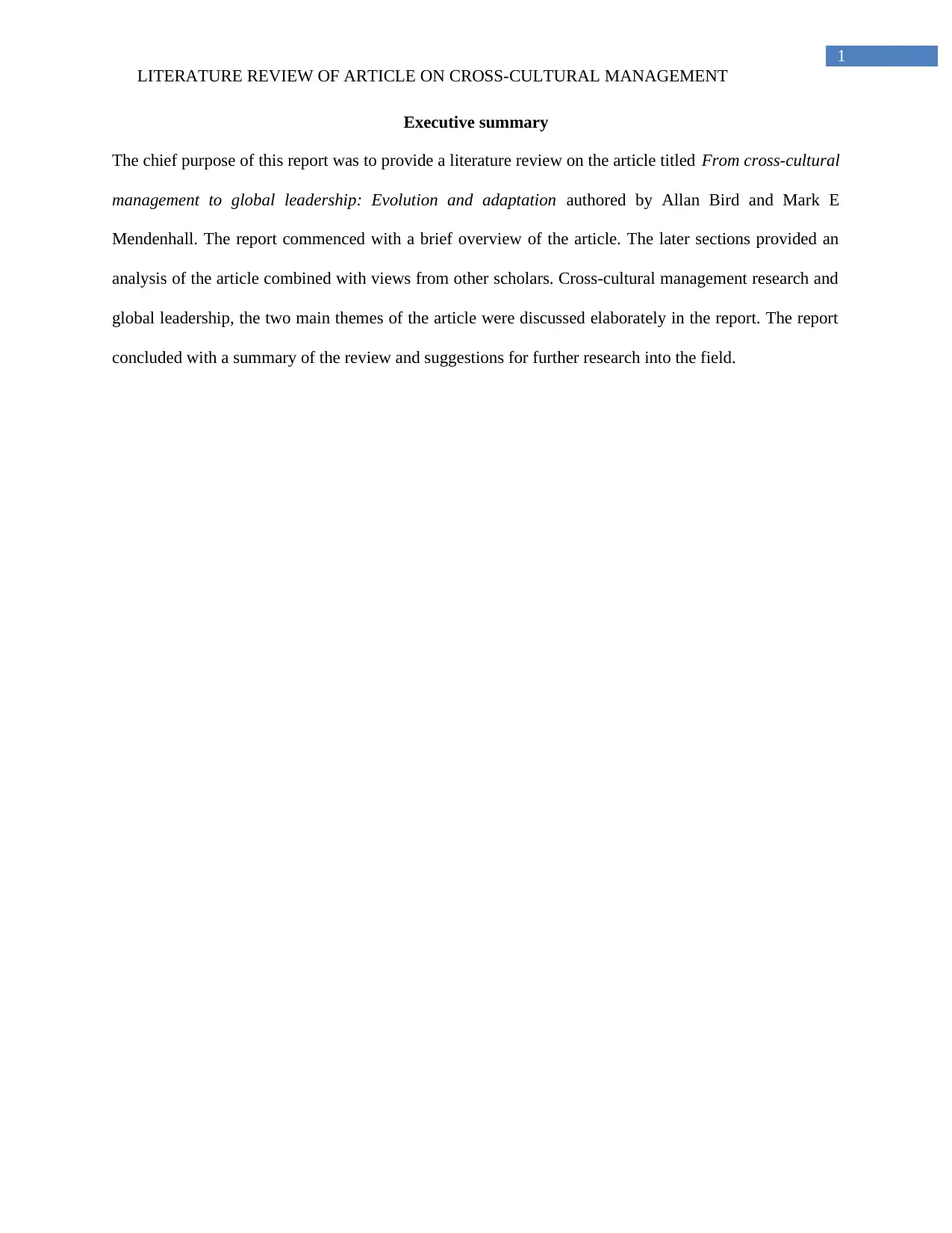
1
LITERATURE REVIEW OF ARTICLE ON CROSS-CULTURAL MANAGEMENT
Executive summary
The chief purpose of this report was to provide a literature review on the article titled From cross-cultural
management to global leadership: Evolution and adaptation authored by Allan Bird and Mark E
Mendenhall. The report commenced with a brief overview of the article. The later sections provided an
analysis of the article combined with views from other scholars. Cross-cultural management research and
global leadership, the two main themes of the article were discussed elaborately in the report. The report
concluded with a summary of the review and suggestions for further research into the field.
LITERATURE REVIEW OF ARTICLE ON CROSS-CULTURAL MANAGEMENT
Executive summary
The chief purpose of this report was to provide a literature review on the article titled From cross-cultural
management to global leadership: Evolution and adaptation authored by Allan Bird and Mark E
Mendenhall. The report commenced with a brief overview of the article. The later sections provided an
analysis of the article combined with views from other scholars. Cross-cultural management research and
global leadership, the two main themes of the article were discussed elaborately in the report. The report
concluded with a summary of the review and suggestions for further research into the field.
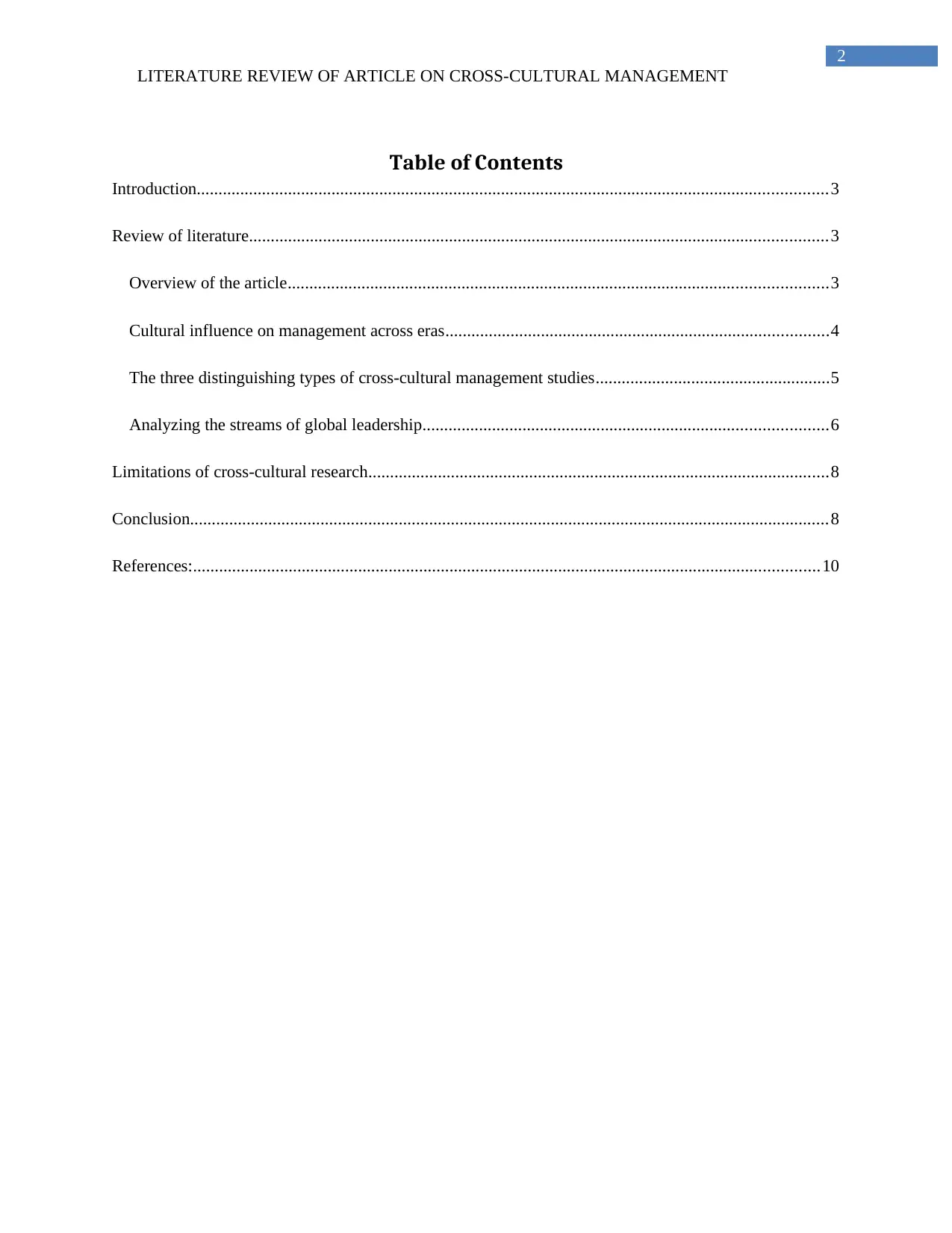
2
LITERATURE REVIEW OF ARTICLE ON CROSS-CULTURAL MANAGEMENT
Table of Contents
Introduction.................................................................................................................................................3
Review of literature.....................................................................................................................................3
Overview of the article............................................................................................................................3
Cultural influence on management across eras........................................................................................4
The three distinguishing types of cross-cultural management studies......................................................5
Analyzing the streams of global leadership.............................................................................................6
Limitations of cross-cultural research..........................................................................................................8
Conclusion...................................................................................................................................................8
References:................................................................................................................................................10
LITERATURE REVIEW OF ARTICLE ON CROSS-CULTURAL MANAGEMENT
Table of Contents
Introduction.................................................................................................................................................3
Review of literature.....................................................................................................................................3
Overview of the article............................................................................................................................3
Cultural influence on management across eras........................................................................................4
The three distinguishing types of cross-cultural management studies......................................................5
Analyzing the streams of global leadership.............................................................................................6
Limitations of cross-cultural research..........................................................................................................8
Conclusion...................................................................................................................................................8
References:................................................................................................................................................10
⊘ This is a preview!⊘
Do you want full access?
Subscribe today to unlock all pages.

Trusted by 1+ million students worldwide
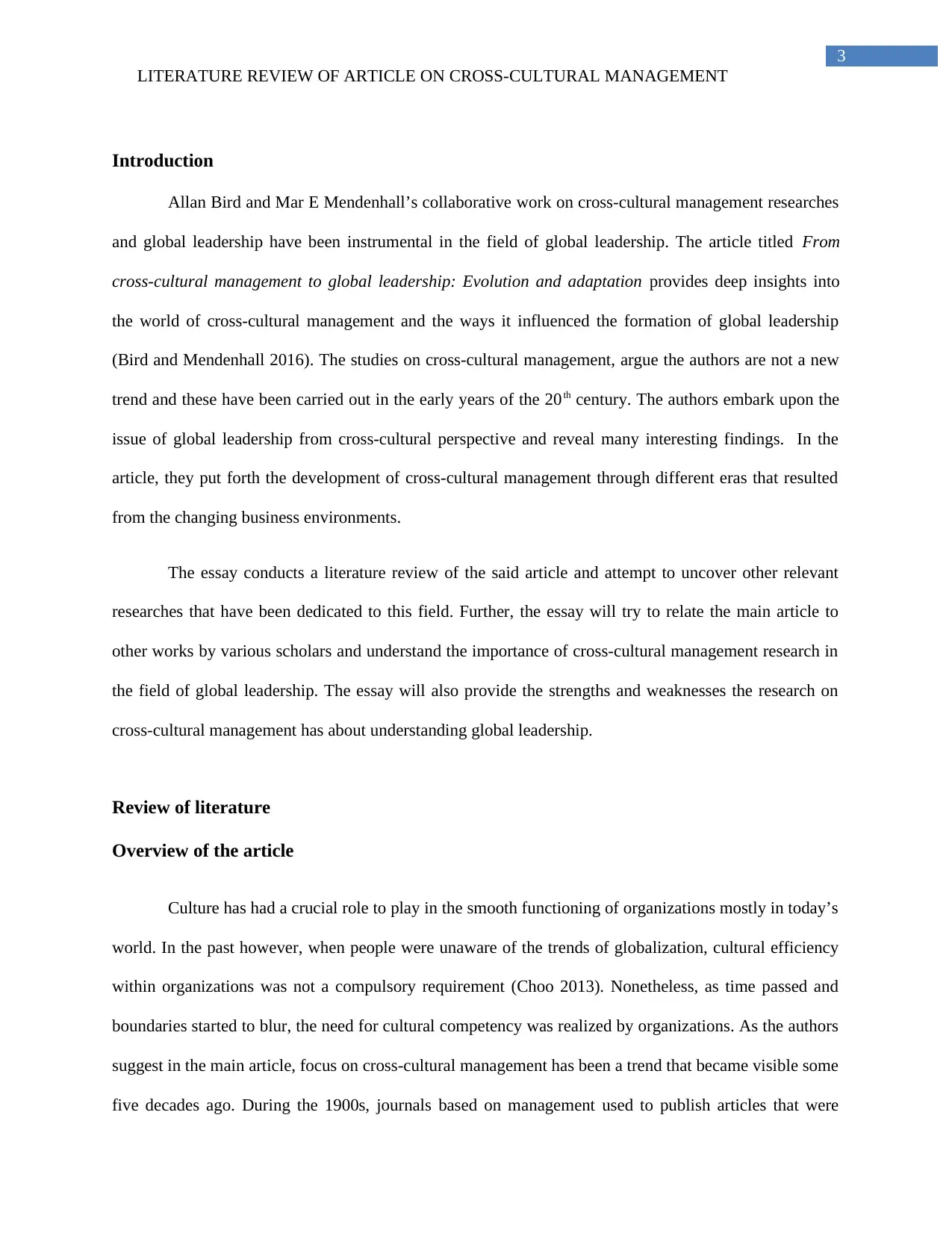
3
LITERATURE REVIEW OF ARTICLE ON CROSS-CULTURAL MANAGEMENT
Introduction
Allan Bird and Mar E Mendenhall’s collaborative work on cross-cultural management researches
and global leadership have been instrumental in the field of global leadership. The article titled From
cross-cultural management to global leadership: Evolution and adaptation provides deep insights into
the world of cross-cultural management and the ways it influenced the formation of global leadership
(Bird and Mendenhall 2016). The studies on cross-cultural management, argue the authors are not a new
trend and these have been carried out in the early years of the 20th century. The authors embark upon the
issue of global leadership from cross-cultural perspective and reveal many interesting findings. In the
article, they put forth the development of cross-cultural management through different eras that resulted
from the changing business environments.
The essay conducts a literature review of the said article and attempt to uncover other relevant
researches that have been dedicated to this field. Further, the essay will try to relate the main article to
other works by various scholars and understand the importance of cross-cultural management research in
the field of global leadership. The essay will also provide the strengths and weaknesses the research on
cross-cultural management has about understanding global leadership.
Review of literature
Overview of the article
Culture has had a crucial role to play in the smooth functioning of organizations mostly in today’s
world. In the past however, when people were unaware of the trends of globalization, cultural efficiency
within organizations was not a compulsory requirement (Choo 2013). Nonetheless, as time passed and
boundaries started to blur, the need for cultural competency was realized by organizations. As the authors
suggest in the main article, focus on cross-cultural management has been a trend that became visible some
five decades ago. During the 1900s, journals based on management used to publish articles that were
LITERATURE REVIEW OF ARTICLE ON CROSS-CULTURAL MANAGEMENT
Introduction
Allan Bird and Mar E Mendenhall’s collaborative work on cross-cultural management researches
and global leadership have been instrumental in the field of global leadership. The article titled From
cross-cultural management to global leadership: Evolution and adaptation provides deep insights into
the world of cross-cultural management and the ways it influenced the formation of global leadership
(Bird and Mendenhall 2016). The studies on cross-cultural management, argue the authors are not a new
trend and these have been carried out in the early years of the 20th century. The authors embark upon the
issue of global leadership from cross-cultural perspective and reveal many interesting findings. In the
article, they put forth the development of cross-cultural management through different eras that resulted
from the changing business environments.
The essay conducts a literature review of the said article and attempt to uncover other relevant
researches that have been dedicated to this field. Further, the essay will try to relate the main article to
other works by various scholars and understand the importance of cross-cultural management research in
the field of global leadership. The essay will also provide the strengths and weaknesses the research on
cross-cultural management has about understanding global leadership.
Review of literature
Overview of the article
Culture has had a crucial role to play in the smooth functioning of organizations mostly in today’s
world. In the past however, when people were unaware of the trends of globalization, cultural efficiency
within organizations was not a compulsory requirement (Choo 2013). Nonetheless, as time passed and
boundaries started to blur, the need for cultural competency was realized by organizations. As the authors
suggest in the main article, focus on cross-cultural management has been a trend that became visible some
five decades ago. During the 1900s, journals based on management used to publish articles that were
Paraphrase This Document
Need a fresh take? Get an instant paraphrase of this document with our AI Paraphraser
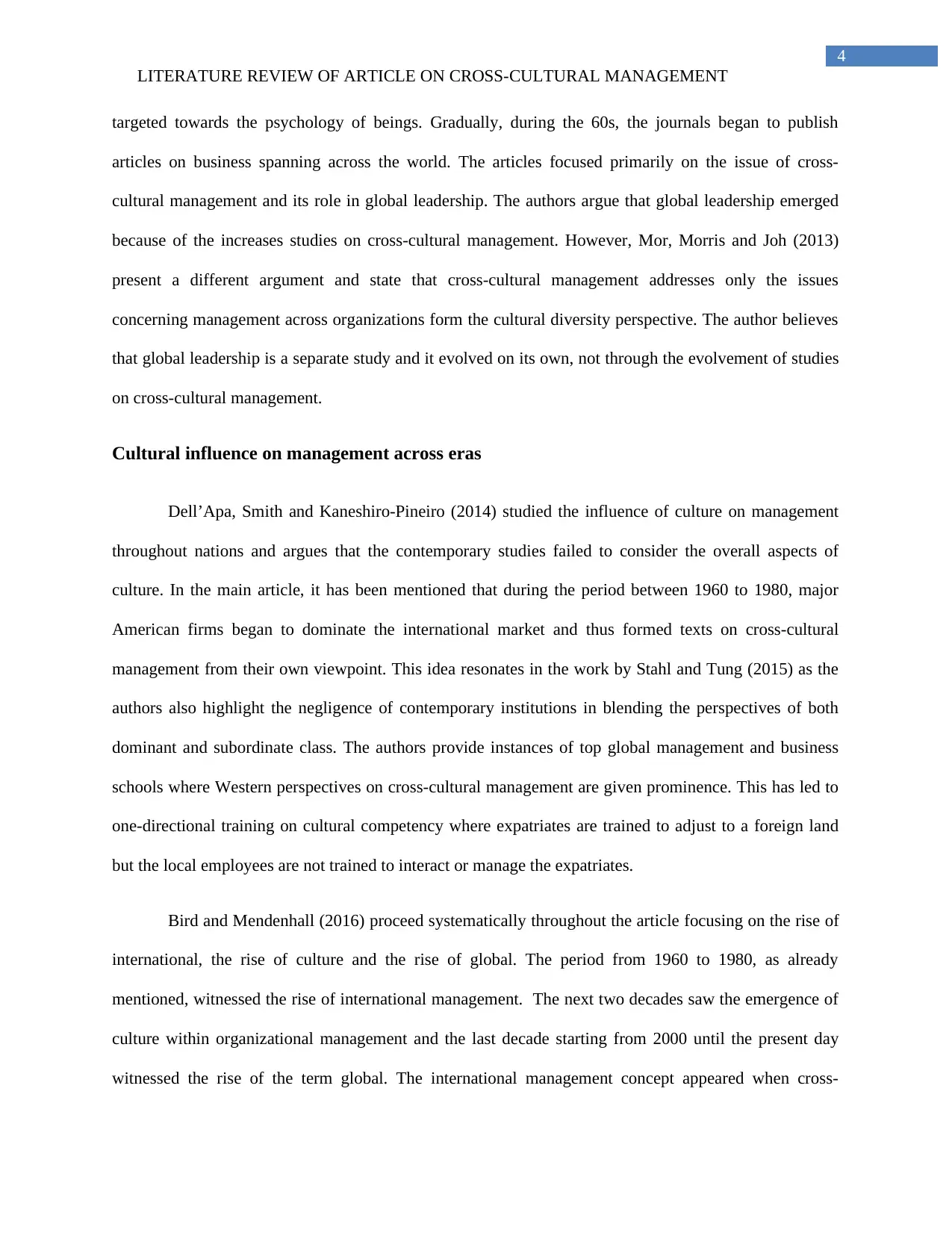
4
LITERATURE REVIEW OF ARTICLE ON CROSS-CULTURAL MANAGEMENT
targeted towards the psychology of beings. Gradually, during the 60s, the journals began to publish
articles on business spanning across the world. The articles focused primarily on the issue of cross-
cultural management and its role in global leadership. The authors argue that global leadership emerged
because of the increases studies on cross-cultural management. However, Mor, Morris and Joh (2013)
present a different argument and state that cross-cultural management addresses only the issues
concerning management across organizations form the cultural diversity perspective. The author believes
that global leadership is a separate study and it evolved on its own, not through the evolvement of studies
on cross-cultural management.
Cultural influence on management across eras
Dell’Apa, Smith and Kaneshiro-Pineiro (2014) studied the influence of culture on management
throughout nations and argues that the contemporary studies failed to consider the overall aspects of
culture. In the main article, it has been mentioned that during the period between 1960 to 1980, major
American firms began to dominate the international market and thus formed texts on cross-cultural
management from their own viewpoint. This idea resonates in the work by Stahl and Tung (2015) as the
authors also highlight the negligence of contemporary institutions in blending the perspectives of both
dominant and subordinate class. The authors provide instances of top global management and business
schools where Western perspectives on cross-cultural management are given prominence. This has led to
one-directional training on cultural competency where expatriates are trained to adjust to a foreign land
but the local employees are not trained to interact or manage the expatriates.
Bird and Mendenhall (2016) proceed systematically throughout the article focusing on the rise of
international, the rise of culture and the rise of global. The period from 1960 to 1980, as already
mentioned, witnessed the rise of international management. The next two decades saw the emergence of
culture within organizational management and the last decade starting from 2000 until the present day
witnessed the rise of the term global. The international management concept appeared when cross-
LITERATURE REVIEW OF ARTICLE ON CROSS-CULTURAL MANAGEMENT
targeted towards the psychology of beings. Gradually, during the 60s, the journals began to publish
articles on business spanning across the world. The articles focused primarily on the issue of cross-
cultural management and its role in global leadership. The authors argue that global leadership emerged
because of the increases studies on cross-cultural management. However, Mor, Morris and Joh (2013)
present a different argument and state that cross-cultural management addresses only the issues
concerning management across organizations form the cultural diversity perspective. The author believes
that global leadership is a separate study and it evolved on its own, not through the evolvement of studies
on cross-cultural management.
Cultural influence on management across eras
Dell’Apa, Smith and Kaneshiro-Pineiro (2014) studied the influence of culture on management
throughout nations and argues that the contemporary studies failed to consider the overall aspects of
culture. In the main article, it has been mentioned that during the period between 1960 to 1980, major
American firms began to dominate the international market and thus formed texts on cross-cultural
management from their own viewpoint. This idea resonates in the work by Stahl and Tung (2015) as the
authors also highlight the negligence of contemporary institutions in blending the perspectives of both
dominant and subordinate class. The authors provide instances of top global management and business
schools where Western perspectives on cross-cultural management are given prominence. This has led to
one-directional training on cultural competency where expatriates are trained to adjust to a foreign land
but the local employees are not trained to interact or manage the expatriates.
Bird and Mendenhall (2016) proceed systematically throughout the article focusing on the rise of
international, the rise of culture and the rise of global. The period from 1960 to 1980, as already
mentioned, witnessed the rise of international management. The next two decades saw the emergence of
culture within organizational management and the last decade starting from 2000 until the present day
witnessed the rise of the term global. The international management concept appeared when cross-
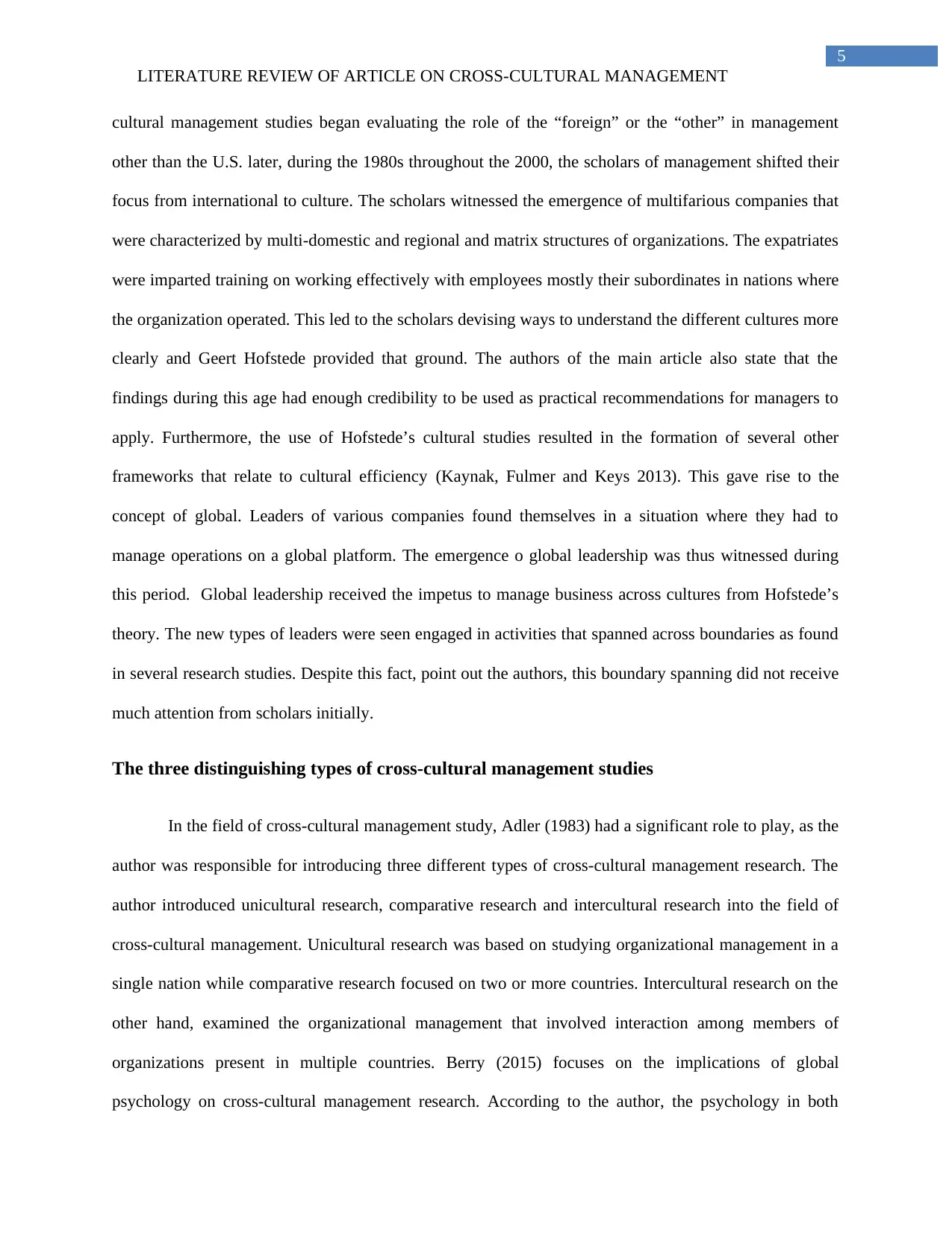
5
LITERATURE REVIEW OF ARTICLE ON CROSS-CULTURAL MANAGEMENT
cultural management studies began evaluating the role of the “foreign” or the “other” in management
other than the U.S. later, during the 1980s throughout the 2000, the scholars of management shifted their
focus from international to culture. The scholars witnessed the emergence of multifarious companies that
were characterized by multi-domestic and regional and matrix structures of organizations. The expatriates
were imparted training on working effectively with employees mostly their subordinates in nations where
the organization operated. This led to the scholars devising ways to understand the different cultures more
clearly and Geert Hofstede provided that ground. The authors of the main article also state that the
findings during this age had enough credibility to be used as practical recommendations for managers to
apply. Furthermore, the use of Hofstede’s cultural studies resulted in the formation of several other
frameworks that relate to cultural efficiency (Kaynak, Fulmer and Keys 2013). This gave rise to the
concept of global. Leaders of various companies found themselves in a situation where they had to
manage operations on a global platform. The emergence o global leadership was thus witnessed during
this period. Global leadership received the impetus to manage business across cultures from Hofstede’s
theory. The new types of leaders were seen engaged in activities that spanned across boundaries as found
in several research studies. Despite this fact, point out the authors, this boundary spanning did not receive
much attention from scholars initially.
The three distinguishing types of cross-cultural management studies
In the field of cross-cultural management study, Adler (1983) had a significant role to play, as the
author was responsible for introducing three different types of cross-cultural management research. The
author introduced unicultural research, comparative research and intercultural research into the field of
cross-cultural management. Unicultural research was based on studying organizational management in a
single nation while comparative research focused on two or more countries. Intercultural research on the
other hand, examined the organizational management that involved interaction among members of
organizations present in multiple countries. Berry (2015) focuses on the implications of global
psychology on cross-cultural management research. According to the author, the psychology in both
LITERATURE REVIEW OF ARTICLE ON CROSS-CULTURAL MANAGEMENT
cultural management studies began evaluating the role of the “foreign” or the “other” in management
other than the U.S. later, during the 1980s throughout the 2000, the scholars of management shifted their
focus from international to culture. The scholars witnessed the emergence of multifarious companies that
were characterized by multi-domestic and regional and matrix structures of organizations. The expatriates
were imparted training on working effectively with employees mostly their subordinates in nations where
the organization operated. This led to the scholars devising ways to understand the different cultures more
clearly and Geert Hofstede provided that ground. The authors of the main article also state that the
findings during this age had enough credibility to be used as practical recommendations for managers to
apply. Furthermore, the use of Hofstede’s cultural studies resulted in the formation of several other
frameworks that relate to cultural efficiency (Kaynak, Fulmer and Keys 2013). This gave rise to the
concept of global. Leaders of various companies found themselves in a situation where they had to
manage operations on a global platform. The emergence o global leadership was thus witnessed during
this period. Global leadership received the impetus to manage business across cultures from Hofstede’s
theory. The new types of leaders were seen engaged in activities that spanned across boundaries as found
in several research studies. Despite this fact, point out the authors, this boundary spanning did not receive
much attention from scholars initially.
The three distinguishing types of cross-cultural management studies
In the field of cross-cultural management study, Adler (1983) had a significant role to play, as the
author was responsible for introducing three different types of cross-cultural management research. The
author introduced unicultural research, comparative research and intercultural research into the field of
cross-cultural management. Unicultural research was based on studying organizational management in a
single nation while comparative research focused on two or more countries. Intercultural research on the
other hand, examined the organizational management that involved interaction among members of
organizations present in multiple countries. Berry (2015) focuses on the implications of global
psychology on cross-cultural management research. According to the author, the psychology in both
⊘ This is a preview!⊘
Do you want full access?
Subscribe today to unlock all pages.

Trusted by 1+ million students worldwide
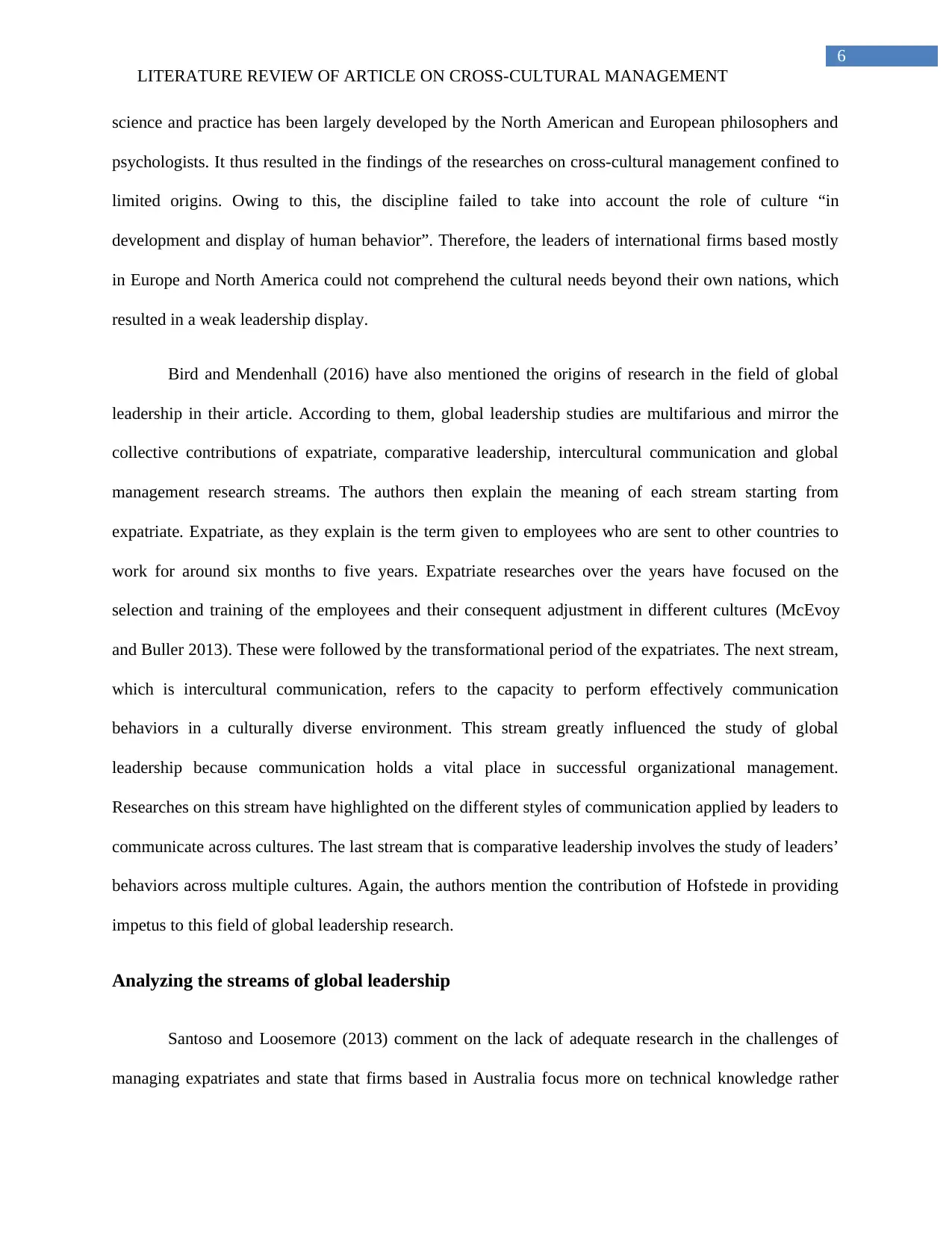
6
LITERATURE REVIEW OF ARTICLE ON CROSS-CULTURAL MANAGEMENT
science and practice has been largely developed by the North American and European philosophers and
psychologists. It thus resulted in the findings of the researches on cross-cultural management confined to
limited origins. Owing to this, the discipline failed to take into account the role of culture “in
development and display of human behavior”. Therefore, the leaders of international firms based mostly
in Europe and North America could not comprehend the cultural needs beyond their own nations, which
resulted in a weak leadership display.
Bird and Mendenhall (2016) have also mentioned the origins of research in the field of global
leadership in their article. According to them, global leadership studies are multifarious and mirror the
collective contributions of expatriate, comparative leadership, intercultural communication and global
management research streams. The authors then explain the meaning of each stream starting from
expatriate. Expatriate, as they explain is the term given to employees who are sent to other countries to
work for around six months to five years. Expatriate researches over the years have focused on the
selection and training of the employees and their consequent adjustment in different cultures (McEvoy
and Buller 2013). These were followed by the transformational period of the expatriates. The next stream,
which is intercultural communication, refers to the capacity to perform effectively communication
behaviors in a culturally diverse environment. This stream greatly influenced the study of global
leadership because communication holds a vital place in successful organizational management.
Researches on this stream have highlighted on the different styles of communication applied by leaders to
communicate across cultures. The last stream that is comparative leadership involves the study of leaders’
behaviors across multiple cultures. Again, the authors mention the contribution of Hofstede in providing
impetus to this field of global leadership research.
Analyzing the streams of global leadership
Santoso and Loosemore (2013) comment on the lack of adequate research in the challenges of
managing expatriates and state that firms based in Australia focus more on technical knowledge rather
LITERATURE REVIEW OF ARTICLE ON CROSS-CULTURAL MANAGEMENT
science and practice has been largely developed by the North American and European philosophers and
psychologists. It thus resulted in the findings of the researches on cross-cultural management confined to
limited origins. Owing to this, the discipline failed to take into account the role of culture “in
development and display of human behavior”. Therefore, the leaders of international firms based mostly
in Europe and North America could not comprehend the cultural needs beyond their own nations, which
resulted in a weak leadership display.
Bird and Mendenhall (2016) have also mentioned the origins of research in the field of global
leadership in their article. According to them, global leadership studies are multifarious and mirror the
collective contributions of expatriate, comparative leadership, intercultural communication and global
management research streams. The authors then explain the meaning of each stream starting from
expatriate. Expatriate, as they explain is the term given to employees who are sent to other countries to
work for around six months to five years. Expatriate researches over the years have focused on the
selection and training of the employees and their consequent adjustment in different cultures (McEvoy
and Buller 2013). These were followed by the transformational period of the expatriates. The next stream,
which is intercultural communication, refers to the capacity to perform effectively communication
behaviors in a culturally diverse environment. This stream greatly influenced the study of global
leadership because communication holds a vital place in successful organizational management.
Researches on this stream have highlighted on the different styles of communication applied by leaders to
communicate across cultures. The last stream that is comparative leadership involves the study of leaders’
behaviors across multiple cultures. Again, the authors mention the contribution of Hofstede in providing
impetus to this field of global leadership research.
Analyzing the streams of global leadership
Santoso and Loosemore (2013) comment on the lack of adequate research in the challenges of
managing expatriates and state that firms based in Australia focus more on technical knowledge rather
Paraphrase This Document
Need a fresh take? Get an instant paraphrase of this document with our AI Paraphraser
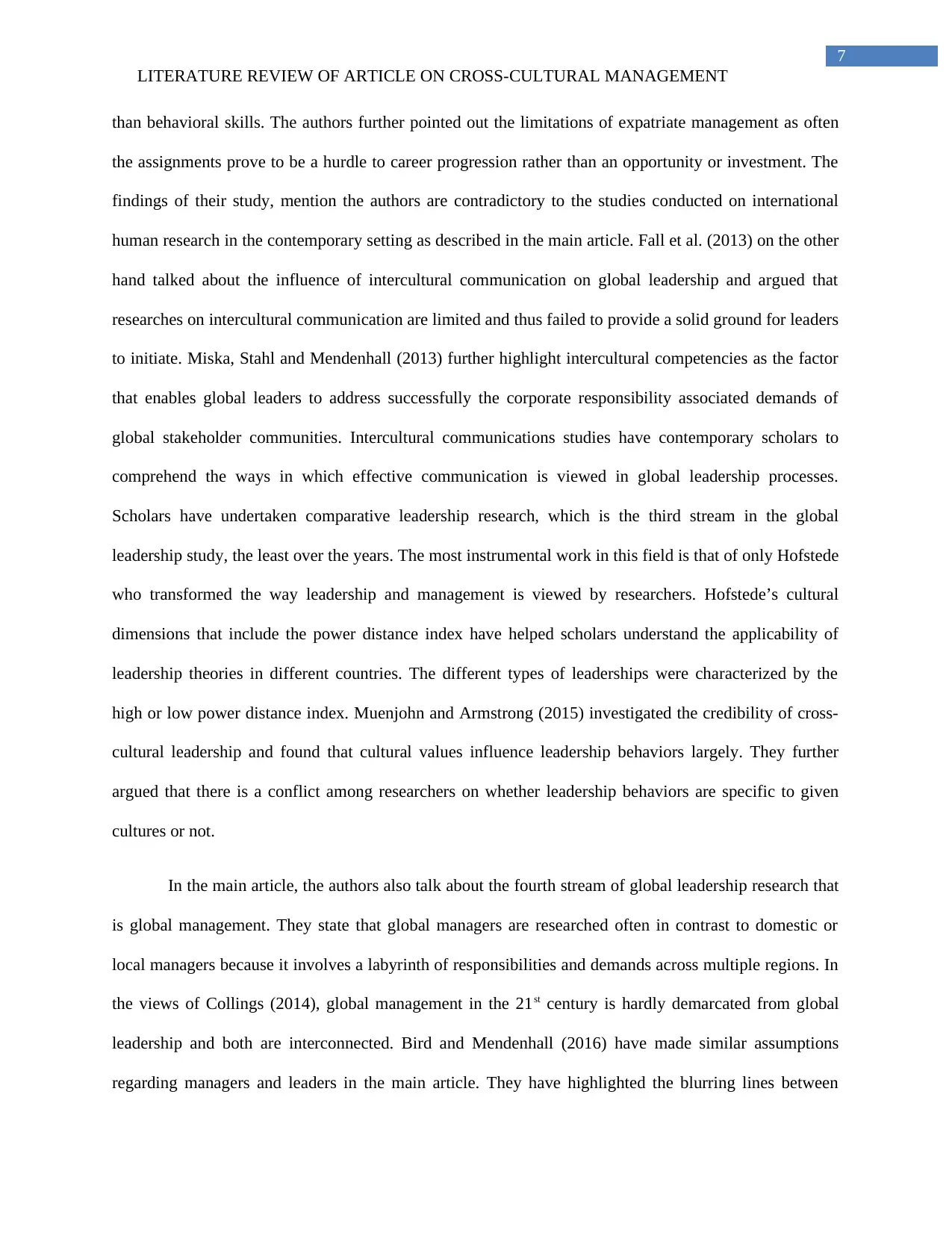
7
LITERATURE REVIEW OF ARTICLE ON CROSS-CULTURAL MANAGEMENT
than behavioral skills. The authors further pointed out the limitations of expatriate management as often
the assignments prove to be a hurdle to career progression rather than an opportunity or investment. The
findings of their study, mention the authors are contradictory to the studies conducted on international
human research in the contemporary setting as described in the main article. Fall et al. (2013) on the other
hand talked about the influence of intercultural communication on global leadership and argued that
researches on intercultural communication are limited and thus failed to provide a solid ground for leaders
to initiate. Miska, Stahl and Mendenhall (2013) further highlight intercultural competencies as the factor
that enables global leaders to address successfully the corporate responsibility associated demands of
global stakeholder communities. Intercultural communications studies have contemporary scholars to
comprehend the ways in which effective communication is viewed in global leadership processes.
Scholars have undertaken comparative leadership research, which is the third stream in the global
leadership study, the least over the years. The most instrumental work in this field is that of only Hofstede
who transformed the way leadership and management is viewed by researchers. Hofstede’s cultural
dimensions that include the power distance index have helped scholars understand the applicability of
leadership theories in different countries. The different types of leaderships were characterized by the
high or low power distance index. Muenjohn and Armstrong (2015) investigated the credibility of cross-
cultural leadership and found that cultural values influence leadership behaviors largely. They further
argued that there is a conflict among researchers on whether leadership behaviors are specific to given
cultures or not.
In the main article, the authors also talk about the fourth stream of global leadership research that
is global management. They state that global managers are researched often in contrast to domestic or
local managers because it involves a labyrinth of responsibilities and demands across multiple regions. In
the views of Collings (2014), global management in the 21st century is hardly demarcated from global
leadership and both are interconnected. Bird and Mendenhall (2016) have made similar assumptions
regarding managers and leaders in the main article. They have highlighted the blurring lines between
LITERATURE REVIEW OF ARTICLE ON CROSS-CULTURAL MANAGEMENT
than behavioral skills. The authors further pointed out the limitations of expatriate management as often
the assignments prove to be a hurdle to career progression rather than an opportunity or investment. The
findings of their study, mention the authors are contradictory to the studies conducted on international
human research in the contemporary setting as described in the main article. Fall et al. (2013) on the other
hand talked about the influence of intercultural communication on global leadership and argued that
researches on intercultural communication are limited and thus failed to provide a solid ground for leaders
to initiate. Miska, Stahl and Mendenhall (2013) further highlight intercultural competencies as the factor
that enables global leaders to address successfully the corporate responsibility associated demands of
global stakeholder communities. Intercultural communications studies have contemporary scholars to
comprehend the ways in which effective communication is viewed in global leadership processes.
Scholars have undertaken comparative leadership research, which is the third stream in the global
leadership study, the least over the years. The most instrumental work in this field is that of only Hofstede
who transformed the way leadership and management is viewed by researchers. Hofstede’s cultural
dimensions that include the power distance index have helped scholars understand the applicability of
leadership theories in different countries. The different types of leaderships were characterized by the
high or low power distance index. Muenjohn and Armstrong (2015) investigated the credibility of cross-
cultural leadership and found that cultural values influence leadership behaviors largely. They further
argued that there is a conflict among researchers on whether leadership behaviors are specific to given
cultures or not.
In the main article, the authors also talk about the fourth stream of global leadership research that
is global management. They state that global managers are researched often in contrast to domestic or
local managers because it involves a labyrinth of responsibilities and demands across multiple regions. In
the views of Collings (2014), global management in the 21st century is hardly demarcated from global
leadership and both are interconnected. Bird and Mendenhall (2016) have made similar assumptions
regarding managers and leaders in the main article. They have highlighted the blurring lines between
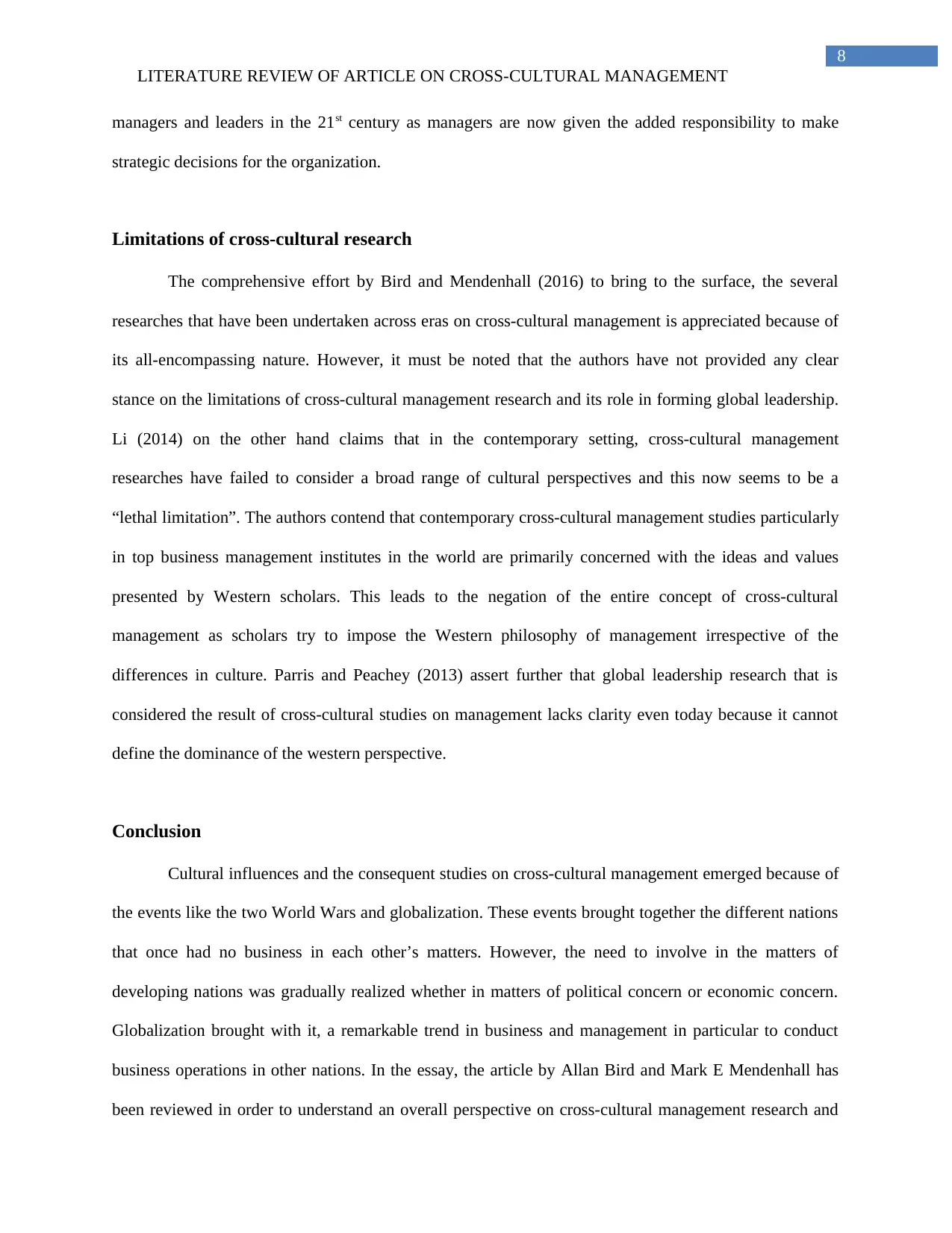
8
LITERATURE REVIEW OF ARTICLE ON CROSS-CULTURAL MANAGEMENT
managers and leaders in the 21st century as managers are now given the added responsibility to make
strategic decisions for the organization.
Limitations of cross-cultural research
The comprehensive effort by Bird and Mendenhall (2016) to bring to the surface, the several
researches that have been undertaken across eras on cross-cultural management is appreciated because of
its all-encompassing nature. However, it must be noted that the authors have not provided any clear
stance on the limitations of cross-cultural management research and its role in forming global leadership.
Li (2014) on the other hand claims that in the contemporary setting, cross-cultural management
researches have failed to consider a broad range of cultural perspectives and this now seems to be a
“lethal limitation”. The authors contend that contemporary cross-cultural management studies particularly
in top business management institutes in the world are primarily concerned with the ideas and values
presented by Western scholars. This leads to the negation of the entire concept of cross-cultural
management as scholars try to impose the Western philosophy of management irrespective of the
differences in culture. Parris and Peachey (2013) assert further that global leadership research that is
considered the result of cross-cultural studies on management lacks clarity even today because it cannot
define the dominance of the western perspective.
Conclusion
Cultural influences and the consequent studies on cross-cultural management emerged because of
the events like the two World Wars and globalization. These events brought together the different nations
that once had no business in each other’s matters. However, the need to involve in the matters of
developing nations was gradually realized whether in matters of political concern or economic concern.
Globalization brought with it, a remarkable trend in business and management in particular to conduct
business operations in other nations. In the essay, the article by Allan Bird and Mark E Mendenhall has
been reviewed in order to understand an overall perspective on cross-cultural management research and
LITERATURE REVIEW OF ARTICLE ON CROSS-CULTURAL MANAGEMENT
managers and leaders in the 21st century as managers are now given the added responsibility to make
strategic decisions for the organization.
Limitations of cross-cultural research
The comprehensive effort by Bird and Mendenhall (2016) to bring to the surface, the several
researches that have been undertaken across eras on cross-cultural management is appreciated because of
its all-encompassing nature. However, it must be noted that the authors have not provided any clear
stance on the limitations of cross-cultural management research and its role in forming global leadership.
Li (2014) on the other hand claims that in the contemporary setting, cross-cultural management
researches have failed to consider a broad range of cultural perspectives and this now seems to be a
“lethal limitation”. The authors contend that contemporary cross-cultural management studies particularly
in top business management institutes in the world are primarily concerned with the ideas and values
presented by Western scholars. This leads to the negation of the entire concept of cross-cultural
management as scholars try to impose the Western philosophy of management irrespective of the
differences in culture. Parris and Peachey (2013) assert further that global leadership research that is
considered the result of cross-cultural studies on management lacks clarity even today because it cannot
define the dominance of the western perspective.
Conclusion
Cultural influences and the consequent studies on cross-cultural management emerged because of
the events like the two World Wars and globalization. These events brought together the different nations
that once had no business in each other’s matters. However, the need to involve in the matters of
developing nations was gradually realized whether in matters of political concern or economic concern.
Globalization brought with it, a remarkable trend in business and management in particular to conduct
business operations in other nations. In the essay, the article by Allan Bird and Mark E Mendenhall has
been reviewed in order to understand an overall perspective on cross-cultural management research and
⊘ This is a preview!⊘
Do you want full access?
Subscribe today to unlock all pages.

Trusted by 1+ million students worldwide
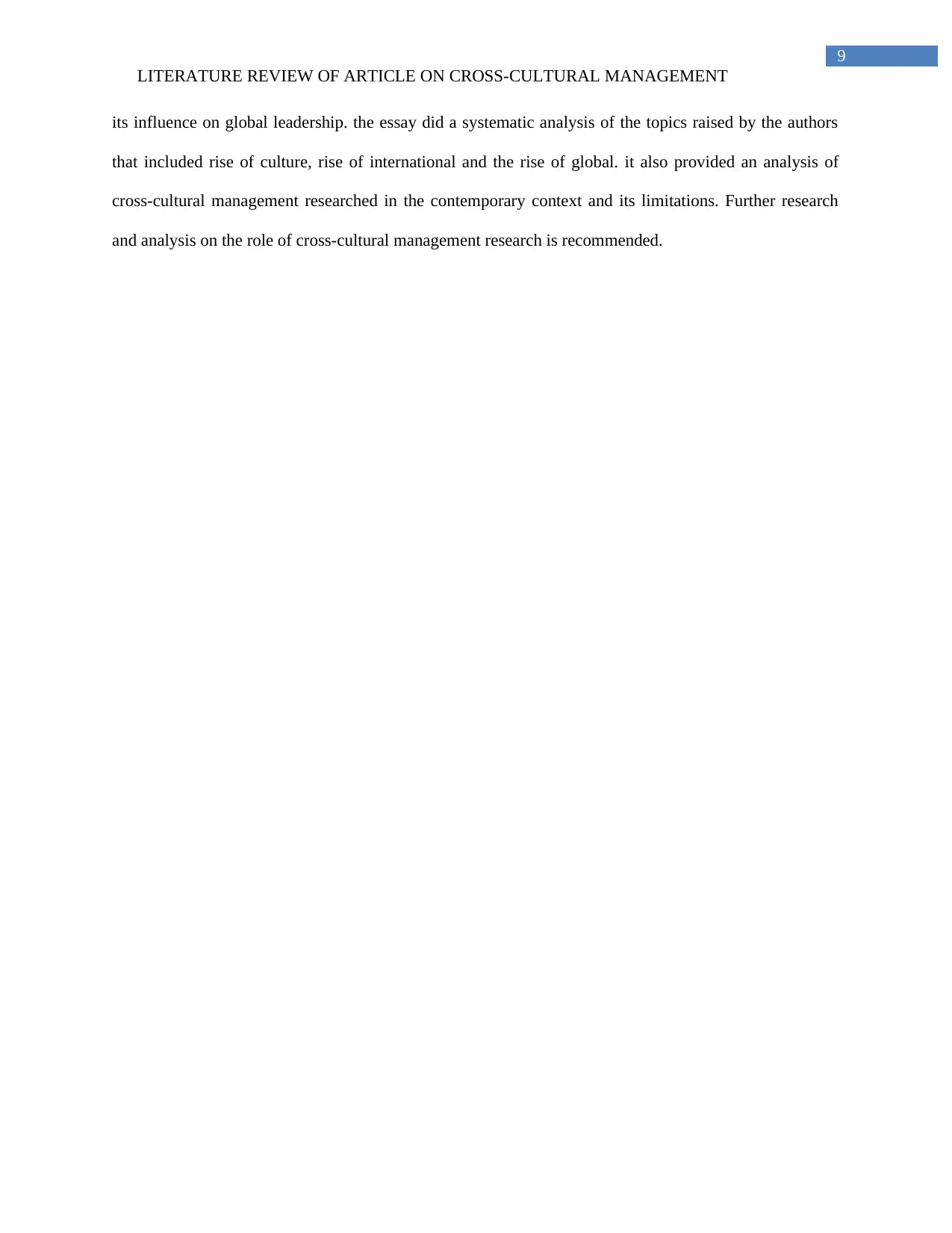
9
LITERATURE REVIEW OF ARTICLE ON CROSS-CULTURAL MANAGEMENT
its influence on global leadership. the essay did a systematic analysis of the topics raised by the authors
that included rise of culture, rise of international and the rise of global. it also provided an analysis of
cross-cultural management researched in the contemporary context and its limitations. Further research
and analysis on the role of cross-cultural management research is recommended.
LITERATURE REVIEW OF ARTICLE ON CROSS-CULTURAL MANAGEMENT
its influence on global leadership. the essay did a systematic analysis of the topics raised by the authors
that included rise of culture, rise of international and the rise of global. it also provided an analysis of
cross-cultural management researched in the contemporary context and its limitations. Further research
and analysis on the role of cross-cultural management research is recommended.
Paraphrase This Document
Need a fresh take? Get an instant paraphrase of this document with our AI Paraphraser
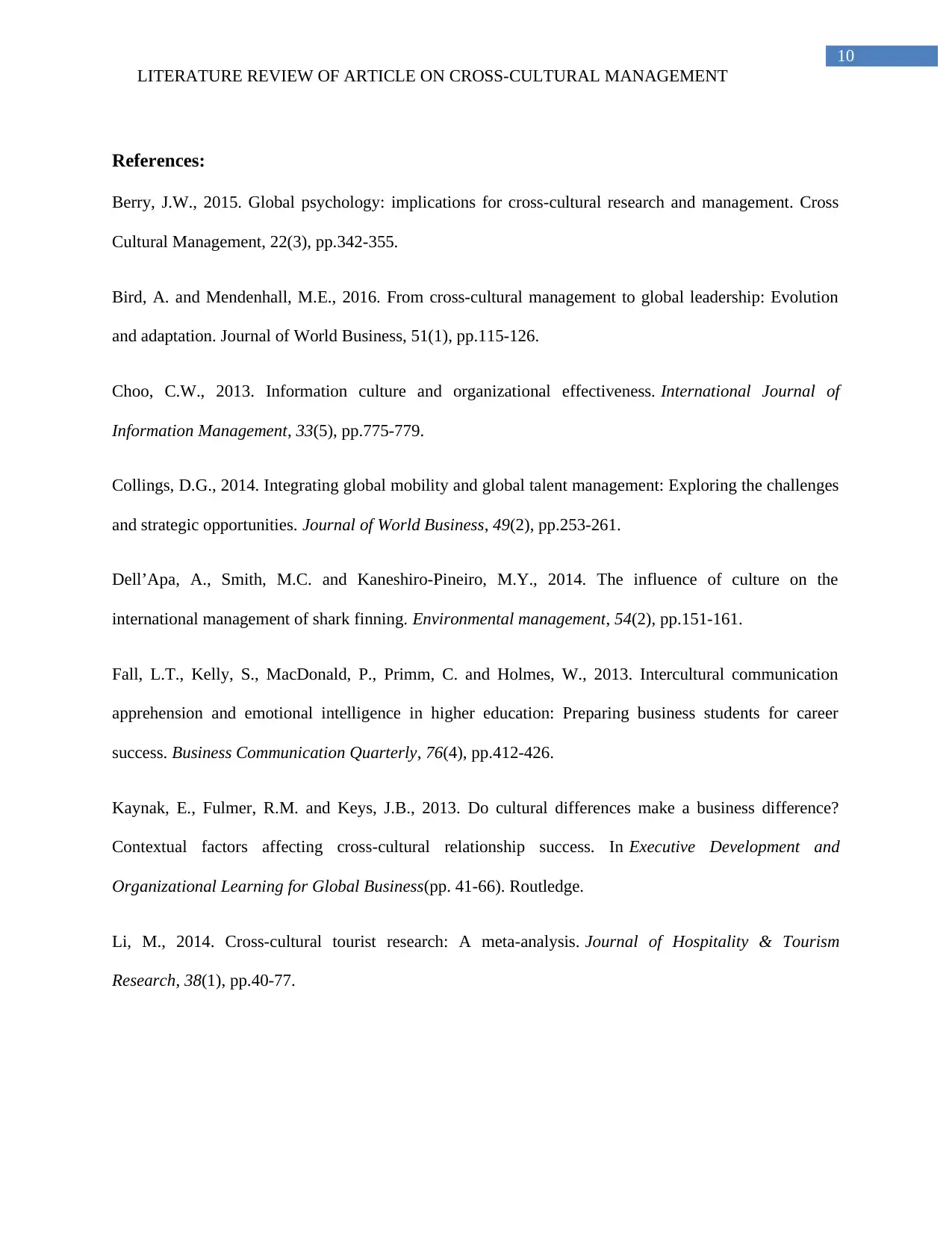
10
LITERATURE REVIEW OF ARTICLE ON CROSS-CULTURAL MANAGEMENT
References:
Berry, J.W., 2015. Global psychology: implications for cross-cultural research and management. Cross
Cultural Management, 22(3), pp.342-355.
Bird, A. and Mendenhall, M.E., 2016. From cross-cultural management to global leadership: Evolution
and adaptation. Journal of World Business, 51(1), pp.115-126.
Choo, C.W., 2013. Information culture and organizational effectiveness. International Journal of
Information Management, 33(5), pp.775-779.
Collings, D.G., 2014. Integrating global mobility and global talent management: Exploring the challenges
and strategic opportunities. Journal of World Business, 49(2), pp.253-261.
Dell’Apa, A., Smith, M.C. and Kaneshiro-Pineiro, M.Y., 2014. The influence of culture on the
international management of shark finning. Environmental management, 54(2), pp.151-161.
Fall, L.T., Kelly, S., MacDonald, P., Primm, C. and Holmes, W., 2013. Intercultural communication
apprehension and emotional intelligence in higher education: Preparing business students for career
success. Business Communication Quarterly, 76(4), pp.412-426.
Kaynak, E., Fulmer, R.M. and Keys, J.B., 2013. Do cultural differences make a business difference?
Contextual factors affecting cross-cultural relationship success. In Executive Development and
Organizational Learning for Global Business(pp. 41-66). Routledge.
Li, M., 2014. Cross-cultural tourist research: A meta-analysis. Journal of Hospitality & Tourism
Research, 38(1), pp.40-77.
LITERATURE REVIEW OF ARTICLE ON CROSS-CULTURAL MANAGEMENT
References:
Berry, J.W., 2015. Global psychology: implications for cross-cultural research and management. Cross
Cultural Management, 22(3), pp.342-355.
Bird, A. and Mendenhall, M.E., 2016. From cross-cultural management to global leadership: Evolution
and adaptation. Journal of World Business, 51(1), pp.115-126.
Choo, C.W., 2013. Information culture and organizational effectiveness. International Journal of
Information Management, 33(5), pp.775-779.
Collings, D.G., 2014. Integrating global mobility and global talent management: Exploring the challenges
and strategic opportunities. Journal of World Business, 49(2), pp.253-261.
Dell’Apa, A., Smith, M.C. and Kaneshiro-Pineiro, M.Y., 2014. The influence of culture on the
international management of shark finning. Environmental management, 54(2), pp.151-161.
Fall, L.T., Kelly, S., MacDonald, P., Primm, C. and Holmes, W., 2013. Intercultural communication
apprehension and emotional intelligence in higher education: Preparing business students for career
success. Business Communication Quarterly, 76(4), pp.412-426.
Kaynak, E., Fulmer, R.M. and Keys, J.B., 2013. Do cultural differences make a business difference?
Contextual factors affecting cross-cultural relationship success. In Executive Development and
Organizational Learning for Global Business(pp. 41-66). Routledge.
Li, M., 2014. Cross-cultural tourist research: A meta-analysis. Journal of Hospitality & Tourism
Research, 38(1), pp.40-77.
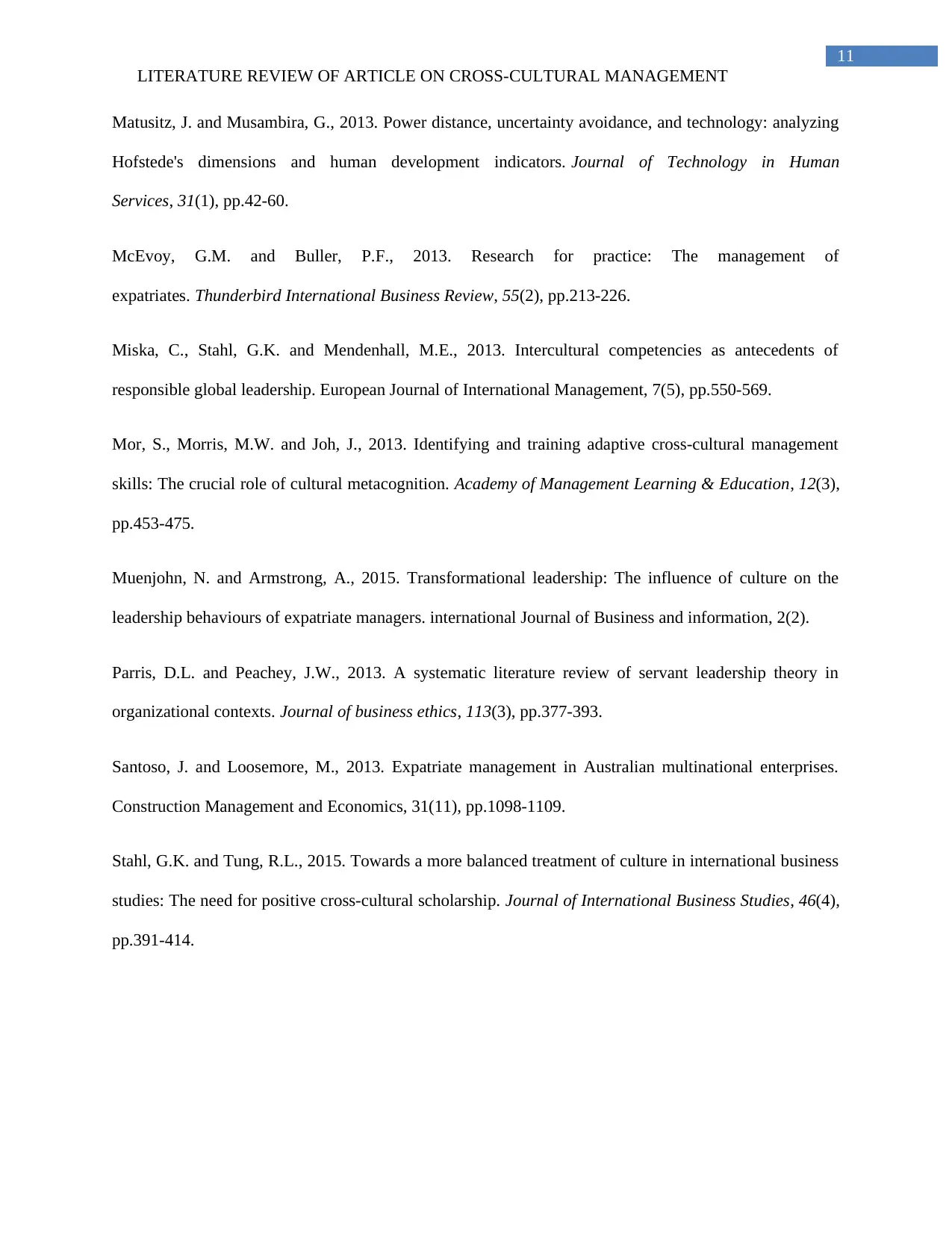
11
LITERATURE REVIEW OF ARTICLE ON CROSS-CULTURAL MANAGEMENT
Matusitz, J. and Musambira, G., 2013. Power distance, uncertainty avoidance, and technology: analyzing
Hofstede's dimensions and human development indicators. Journal of Technology in Human
Services, 31(1), pp.42-60.
McEvoy, G.M. and Buller, P.F., 2013. Research for practice: The management of
expatriates. Thunderbird International Business Review, 55(2), pp.213-226.
Miska, C., Stahl, G.K. and Mendenhall, M.E., 2013. Intercultural competencies as antecedents of
responsible global leadership. European Journal of International Management, 7(5), pp.550-569.
Mor, S., Morris, M.W. and Joh, J., 2013. Identifying and training adaptive cross-cultural management
skills: The crucial role of cultural metacognition. Academy of Management Learning & Education, 12(3),
pp.453-475.
Muenjohn, N. and Armstrong, A., 2015. Transformational leadership: The influence of culture on the
leadership behaviours of expatriate managers. international Journal of Business and information, 2(2).
Parris, D.L. and Peachey, J.W., 2013. A systematic literature review of servant leadership theory in
organizational contexts. Journal of business ethics, 113(3), pp.377-393.
Santoso, J. and Loosemore, M., 2013. Expatriate management in Australian multinational enterprises.
Construction Management and Economics, 31(11), pp.1098-1109.
Stahl, G.K. and Tung, R.L., 2015. Towards a more balanced treatment of culture in international business
studies: The need for positive cross-cultural scholarship. Journal of International Business Studies, 46(4),
pp.391-414.
LITERATURE REVIEW OF ARTICLE ON CROSS-CULTURAL MANAGEMENT
Matusitz, J. and Musambira, G., 2013. Power distance, uncertainty avoidance, and technology: analyzing
Hofstede's dimensions and human development indicators. Journal of Technology in Human
Services, 31(1), pp.42-60.
McEvoy, G.M. and Buller, P.F., 2013. Research for practice: The management of
expatriates. Thunderbird International Business Review, 55(2), pp.213-226.
Miska, C., Stahl, G.K. and Mendenhall, M.E., 2013. Intercultural competencies as antecedents of
responsible global leadership. European Journal of International Management, 7(5), pp.550-569.
Mor, S., Morris, M.W. and Joh, J., 2013. Identifying and training adaptive cross-cultural management
skills: The crucial role of cultural metacognition. Academy of Management Learning & Education, 12(3),
pp.453-475.
Muenjohn, N. and Armstrong, A., 2015. Transformational leadership: The influence of culture on the
leadership behaviours of expatriate managers. international Journal of Business and information, 2(2).
Parris, D.L. and Peachey, J.W., 2013. A systematic literature review of servant leadership theory in
organizational contexts. Journal of business ethics, 113(3), pp.377-393.
Santoso, J. and Loosemore, M., 2013. Expatriate management in Australian multinational enterprises.
Construction Management and Economics, 31(11), pp.1098-1109.
Stahl, G.K. and Tung, R.L., 2015. Towards a more balanced treatment of culture in international business
studies: The need for positive cross-cultural scholarship. Journal of International Business Studies, 46(4),
pp.391-414.
⊘ This is a preview!⊘
Do you want full access?
Subscribe today to unlock all pages.

Trusted by 1+ million students worldwide
1 out of 12
Related Documents
Your All-in-One AI-Powered Toolkit for Academic Success.
+13062052269
info@desklib.com
Available 24*7 on WhatsApp / Email
![[object Object]](/_next/static/media/star-bottom.7253800d.svg)
Unlock your academic potential
Copyright © 2020–2026 A2Z Services. All Rights Reserved. Developed and managed by ZUCOL.





